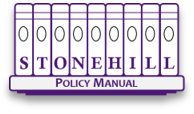Effective Date: June 20, 2023
Last Reviewed: June 20, 2023
Policy Statement
The College Payroll Department is responsible for processing timely and accurate payment for all employees and student workers while adhering to College guidelines, as well as federal and state regulations.
All compensation paid to College employees for services rendered to the College must be processed through the College payroll system.
Individuals paid outside of the payroll system for services provided to the college are independent contractors paid through the College accounts payable system.
Pay and Pay Dates
Faculty, Exempt, and Non-Exempt Staff
Employees under these classifications are paid on a biweekly basis.
(ie: every other Friday). Pay dates are published annually by HR on a Payroll Calendar.
Adjuncts
Adjunct faculty members are paid on a bi-weekly payroll basis. Adjunct faculty are paid on a per-semester basis and according to dates specified in their contracts with the College.
Stipend Payments
Stipend payments are paid monthly on the Friday after the first biweekly payroll of the month. Pay schedules and pay dates are posted on the Monthly Payroll calendar.
Employee and Supervisor Responsibility for Timecards
The timely and accurate submission an employee’s timecard is the responsibility of that individual employee. Supervisors must review timecards for accuracy and approve them on a timely basis.
Failure by the employee to submit an accurate timecard by the submission deadline or failure of the supervisor to approve timecards by the approval deadline may result in delays in payment to employees.
It is the responsibility of the employee to record accurate time and leave information on their timecards. Failure to provide correct information can result in disciplinary action, up to and including termination.
Withholdings
Mandatory Withholdings
Stonehill College is required by law to make certain mandatory deductions from employee paychecks. The standard withholdings made by the College are for Social Security, Medicare, federal income, and state income taxes.
The College must also reduce an employee’s gross pay for legally required garnishments. Garnishments include but are not limited to student loans, tax levies, child support, and bankruptcies.
Voluntary Withholdings
Voluntary deductions are authorized by the employee and include, but are not limited to, health insurance, retirement contributions, union dues, select charitable contributions, and flexible spending accounts.
Taxable Fringe Benefits
According to Internal Revenue Service (IRS) regulations, the value of certain fringe benefits received by an employee from the employer is considered taxable and must be included as compensation on the employee’s paycheck(s) and Form W-2. The value of the taxable fringe benefit is added to the employee’s gross pay and increases the amount of applicable tax withholdings or mandatory contributions.
All taxable fringe benefits are required to be processed through the payroll system. For tax purposes, all taxable fringe benefits must be processed during the calendar year in which they were provided.
The following are considered to be taxable fringe benefits and included on employee paychecks and W-2 as appropriate.
- life insurance paid by the employer (over IRS limit)
- personal use of a college owned vehicle
- use of college owned housing (unless required by employer)
- certain housing allowances
- cell phone stipends
- discounts on services (based on fair market value)
- moving expenses
Distribution of Pay
Electronic direct deposit is the mandatory payment method for all Stonehill College employees. Electronic direct deposit ensures that an employee’s pay is securely transferred to the employee’s bank account on payday, offers enhanced paycheck security, and results in operational efficiencies.
As part of the mandatory direct deposit enrollment, employees are responsible for completing and maintaining direct deposit information via MyHill.
Overpayments
On occasion, due to errors in processing, timeliness of submission, and/or reporting, employees may be paid more than is owed to them. This policy establishes roles and responsibilities for collecting overpayments.
The College Payroll Office has the authority and responsibility to create, implement, monitor, modify, and enforce operating procedures and internal control processes consistent with this policy to ensure reasonable efforts are undertaken by departments to collect overpayments from current and former employees in compliance with the College’s legal obligations.
When a department or an employee becomes aware of a payroll overpayment, the Payroll Office must be contacted immediately. If the overpayment is reported before pay day, Payroll will void the employee’s pay, cancel the direct deposit, and re-issue the correct payment to the employee on pay day. Otherwise, overpayments must be repaid to the College. The College reserves the right to reverse a direct deposit which has already occurred if it includes an overpayment.
No employee is entitled to retain any payment exceeding the amount earned. All overpayments’ collections must occur in the same calendar year as the overpayment.
